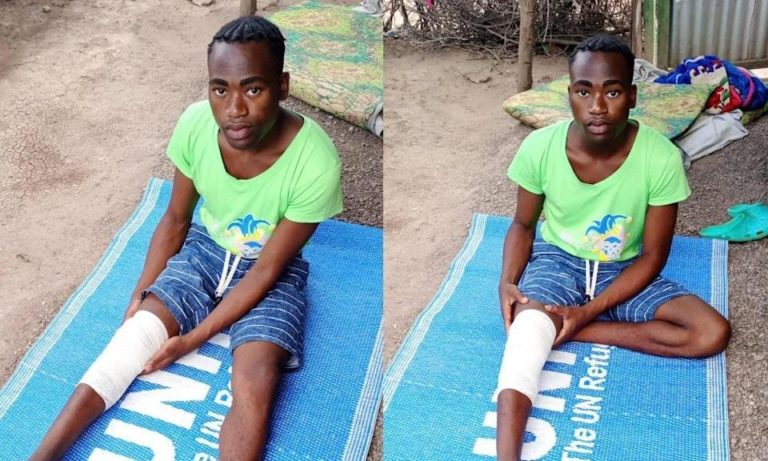

A gay refugee in Kakuma, Kenya, was left with a shattered knee after a homophobe “ambushed” him Wednesday morning (28 April).
As Canary Murungi walked on foot to the shops in the Kakuma Refugee Camp at 11am, a fellow refugee from Sudan spotted him, he told PinkNews.
“He ambushed me,” he said, “and questioned why I am a homosexual. He then violently pushed me, causing me to reinjure my right leg.”
Medics at the camp’s clinics have given Murungi “ibuprofen and Panadol”, a brand of paracetamol. He is now desperately searching for a physiotherapist to alleviate his agony, he said.
For Murungi, it’s almost like Groundhog Day. More than a year ago, he suffered a near-identical attack which left him with “broken bones and dislocated joints”.
“I was attacked, beaten and thrown into a long ditch,” Murungi recalled of the March 2020 incident.
“I am in deep pain. I have no help. It has been horrible.”
At the time, he grappled with whether to use “all the cash” he had on him to pay for a physiotherapist. Until then, all Murungi could do was pour warm water on his leg to tend to the pain.
It was only in September that Murungi no longer needed crutches to walk around. Now his recovery has been thrown into jeopardy.
Such scenes are an all too common sight in Kakuma, a small, impoverished town in northwestern Kenya and the site of one of the largest refugee camps in the country.

The camp is co-managed by the United Nations High Commissioner for Refugees, the Kenyan government and the Kenyan Department of Refugee Affairs.
Dozens of queer refugees have been stuck in a violent and murky limbo for years in Kakuma. Each day presents with it increasingly difficult decisions.
Lodging in rickety shelters made of ribbed metal roof panels, reinforced plastic or tents made of tarpaulin sheets, LGBT+ camp residents speak of a life of hunger, limited medical resources and a spectre of violence that haunts them every day.
And for many, their story is the same.
Born in Uganda, they fled from a life of hardship and homophobia to neighbouring Kenya, often with few possessions besides the clothing they wore, to be placed at Kakuma by the immigration authorities.
But in the camp, terror has gripped them. Just weeks before Murungi was assaulted, he and the around 130 other LGBT+ refugees living in block 13 of the camp were grieving.
Chriton “Trinidad Jerry” Atuhwera, described by residents as a “proud trans man”, died of the injuries he sustained after a gang lobbed incendiary devices at his shelter.
His death only compounded the seemingly endless fear the refugees feel.
Many have sparred with gangs of anti-LGBT+ refugees and nearby town locals who have raped them, stabbed them, pelted them with rocks, struck them with sticks and stones and threatened to kill them on an almost daily basis.
Refugees have said they sleep in shifts to keep watch, and this vigilance is deeply eroding the hope they first held coming into the camp.
Now, the refugees are urging people to donate to their GoFundMe as well as to a donation page set up by the Australian activist group, Human in Need.
“Kakuma is brutal,” Murungi said.
“I have felt so much pain, I feel like the world has totally rejected me because I have gone through so much homophobia.”